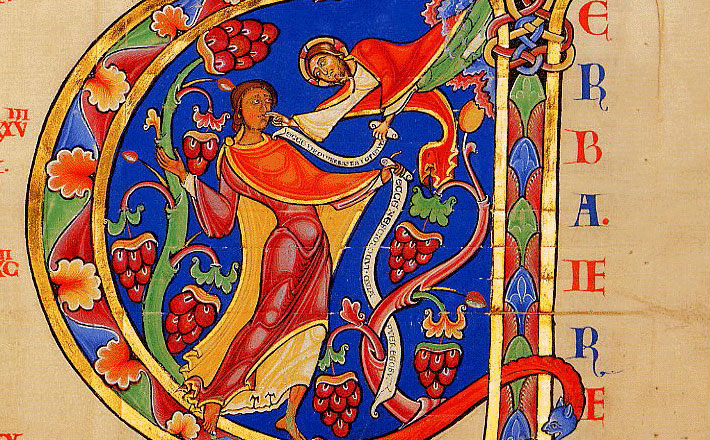Commentary on Psalm 26:1-8
I teach at a college that emphasizes the integration of faith and learning. We strive for students to realize that their knowledge and their beliefs should not — and ultimately cannot — be kept in separate compartments of their lives.
Even more than this realization, however, is our desire that they actually experience this integration. Psalm 26 is a prayer for something very similar, namely, that the aspects of the poet’s life have integrity; indeed, the psalm is an eloquent and forceful declaration that the poet has experienced this integrity inside and out.
Preachers, teachers, and worship leaders using Psalm 26 for this Sunday will find some historical, literary, and theological hurdles to clear on their way to integrating the message of the psalm into their sermons, lessons, and liturgies. First, in terms of the psalm’s historical setting, numerous proposals pretty much fall into one of two types, namely, a ritual setting (for priests or pilgrims at the temple), or some kind of personal crisis, such as being falsely accused.1
For reasons I’ll discuss below, I lean more toward the ritual setting, but that doesn’t mean a poet wasn’t also drawing on personal experiences. A second and related problem is pinning down the literary form of the psalm. Most scholars have moved beyond Gunkel’s “lament” category to talk about entrance liturgies, pilgrim psalms, or protestations of innocence; but each proposal struggles to explain every element in the psalm.
Closely tied to literary genre is a third issue, literary structure. Twenty-five years ago, Paul Mosca consulted at least two dozen commentaries and articles to reveal almost no scholarly agreement on structure of the psalm,2 and the situation hasn’t really improved. Finally, on top of these critical issues, is the matter of theological interpretation. How do we incorporate in Christian worship a psalm that seems to proclaim self-righteousness?
Although we could view it mainly as a prophecy of Jesus’ righteous presence in the temple, the way forward is not by leaping to the New Testament or retreating behind our sincerely held doctrines. To the contrary, we discover the theological underpinnings of the psalm by means of embracing its own rhetorical shape and features.
On this particular Sunday, the lectionary limits the passage to the psalm’s first eight verses.3 This choice is almost certainly for thematic reasons, since the whole psalm clearly has a literary unity by virtue of its reference to “walking in integrity” (verses 1, 11) and repetitions that link verses 1-8 to verses 9-12, such as “hands” (verses 6, 10). Psalm 26 relates to other readings for this Sunday, which touch on matters of integrity (Jeremiah 15), awareness of God’s holiness (Exodus 3), self-denial (Matthew 16) and transformation (Romans 12).
Moreover, verses 1-8 express a coherent argument at their core, with a list of seven or eight expressions about things that the psalmist has either avoided or embraced (verses 4-7). It is therefore possible to engage this section of the psalm homiletically and liturgically if one keeps in mind its immediate literary context. Here are three possible ways to relate the psalm to Christian experience.
First, for all of the benefits that go with creating a warm and welcoming environment for our Lord’s Day gatherings, Christian worship remains an encounter with the Triune God, our creator, redeemer, and sustainer. Psalm 26, by virtue of its significant parallels with Psalms 15 and 24, is likely best understood as presenting a sobering statement of the requirements for priestly entrance into God’s holy presence.4
In an Israelite context, serving in the temple and “going around your altar” (verse 6) created a dangerous encounter for priests (compare Leviticus 10:1-3) who represented Israel to God.5 As Peter Craigie put it, the psalm warned about “a casual approach to worship, from which hypocritical and superficial attitudes could easily emerge.”6
There is, if course, not a perfect correspondence between this aspect of Israelite religion and our Christian context, but there is nothing in our theology of union with Christ that eliminates the need for entering our worship services with a joyful (note verse 7) yet sincere mindfulness that the business of worship truly draws us into the presence of God. As Brother Lawrence implores, “Let it be your business to keep your mind in the presence of the LORD.”7
Second, in spite of the problems that arise if we simply transport into our own setting the abundance of language about avoiding the “worthless,” “hypocrites,” and “evildoers” (verses 4-5; see also verses 9-10), there is still a point to be made about the church’s cultural context. As much as we are called to participate in society, it does no good to deny the existence of evil within society.
So, on one level, this psalm challenges the church to avoid conformity with the world (Romans 12:1-2) even as it submits to God instead of idols of our own making. “There is,” as Clinton McCann writes, “a legitimate form of separatism.”8
But, on another level, awareness of the evil “out there” should prompt us toward a renewed look within ourselves. Psalm 26 is not an invitation to engage in a culture war with the enemies of God; instead, it bids us to seek that integrity within ourselves that lends legitimacy to our witness for Christ in a troubled world.
Third, and building on both of the above points, Psalm 26 is a far cry from the apparent works-righteousness that a simplistic reading might first indicate. To be sure, the poet’s claim of innocence and daring request that God test him (verses 1-2) seems striking and out of place coming on the heels of a Psalm 25’s pleadings for mercy and forgiveness.9
But we have to keep reading through verse 3, because there we come to understand that the key to the psalmist’s confidence is trust in God’s “steadfast love,” the Hebrew concept of hesed.10
A Christian reading of Psalm 26 recognizes the gospel of grace in that word; for God’s steadfast love is manifested in the person and work of Jesus Christ. Any hope for our personal integrity will find its fulfillment in him.
Notes:
1 W. H. Bellinger, Psalm XXVI: A Test of Method” VT 43 (1993): 455-456.
2 Paul G. Mosca, “Psalm 26: Poetic Structure and the Form-critical Task” CBQ 47 (1985): 218.
3 The entire psalm is read for Proper 22, Year B.
4 Craig C. Broyles, Psalms (Peabody, MA: Hendrickson Publishers, 1999), 138.
5 Richard J. Clifford, Psalms 1-72 (Nashville: Abingdon Press, 2002), 142-143.
6 Peter C. Craigie, Psalms 1-50 (Waco: Word Books Publisher, 1983), 227.
7 From letter 8, “The Practice of the Presence of God” (Grand Rapids: Christian Classics Ethereal Library) < http://www.ccel.org/ccel/lawrence/practice.pdf > Accessed on April 14, 2014.
8 J. Clinton McCann, Jr., “The Book of Psalms” in New Interpreter’s Bible (Nashville: Abingdon, 1996), 783.
9 Geoffrey W. Grogan, Psalms, (Grand Rapids: Eerdmans, 2008), 78.
10 Grogan, 79.


August 31, 2014